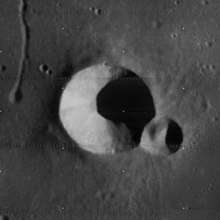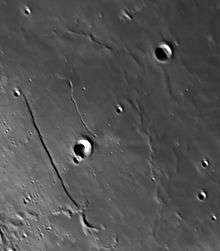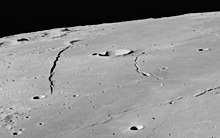Birt (crater)
Birt is a lunar impact crater located in the eastern half of the Mare Nubium and west of the Rupes Recta. It was named after British selenographer William R. Birt.[1]
 | |
| Coordinates | 22.4°S 8.5°W |
|---|---|
| Diameter | 17 km |
| Depth | 3.5 km |
| Colongitude | 9° at sunrise |
| Eponym | William R. Birt |

The crater Birt (lower left centre) and other features on the Moon, also Rima Birt - a slightly curved ~50 km long channel that starts and ends in a pit. Photo: Georgi Georgiev, Stara Zagora, Bulgaria. Since this is a telescopic view, this image is inverted.
Birt is a bowl-shaped formation with a raised rim, slightly intersected along the southeast edge by the much smaller crater Birt A. To the west of Birt, a rille named Rima Birt runs north-northwest in an arc from Birt F to Birt E.

Oblique view of Rupes Recta (left), Birt (center), and Rima Birt (right), from Apollo 16
Satellite craters
By convention these features are identified on lunar maps by placing the letter on the side of the crater midpoint that is closest to Birt.
| Birt | Latitude | Longitude | Diameter |
|---|---|---|---|
| A | 22.5° S | 8.2° W | 7 km |
| B | 22.2° S | 10.2° W | 5 km |
| C | 23.7° S | 8.3° W | 2 km |
| D | 21.0° S | 9.8° W | 3 km |
| E | 20.7° S | 9.6° W | 5 km |
| F | 22.3° S | 9.1° W | 3 km |
| G | 23.1° S | 8.2° W | 2 km |
| H | 23.0° S | 9.1° W | 2 km |
| J | 23.0° S | 9.4° W | 2 km |
| K | 22.4° S | 9.7° W | 2 km |
| L | 21.6° S | 9.3° W | 3 km |
gollark: It's *generally* not good for gaming.
gollark: Works *sometimes*, that is.
gollark: It *works*, if you *need* to use something, but yes, it is slow and the GUI is kind of horrible.
gollark: Also `wine`, for *some* stuff.
gollark: Which work on Linux, I mean.
References
- "Birt (crater)". Gazetteer of Planetary Nomenclature. USGS Astrogeology Research Program.
- Andersson, L. E.; Whitaker, E. A. (1982). NASA Catalogue of Lunar Nomenclature. NASA RP-1097.CS1 maint: ref=harv (link)
- Bussey, B.; Spudis, P. (2004). The Clementine Atlas of the Moon. New York: Cambridge University Press. ISBN 978-0-521-81528-4.CS1 maint: ref=harv (link)
- Cocks, Elijah E.; Cocks, Josiah C. (1995). Who's Who on the Moon: A Biographical Dictionary of Lunar Nomenclature. Tudor Publishers. ISBN 978-0-936389-27-1.CS1 maint: ref=harv (link)
- McDowell, Jonathan (July 15, 2007). "Lunar Nomenclature". Jonathan's Space Report. Retrieved 2007-10-24.CS1 maint: ref=harv (link)
- Menzel, D. H.; Minnaert, M.; Levin, B.; Dollfus, A.; Bell, B. (1971). "Report on Lunar Nomenclature by the Working Group of Commission 17 of the IAU". Space Science Reviews. 12 (2): 136–186. Bibcode:1971SSRv...12..136M. doi:10.1007/BF00171763.CS1 maint: ref=harv (link)
- Moore, Patrick (2001). On the Moon. Sterling Publishing Co. ISBN 978-0-304-35469-6.CS1 maint: ref=harv (link)
- Price, Fred W. (1988). The Moon Observer's Handbook. Cambridge University Press. ISBN 978-0-521-33500-3.CS1 maint: ref=harv (link)
- Rükl, Antonín (1990). Atlas of the Moon. Kalmbach Books. ISBN 978-0-913135-17-4.CS1 maint: ref=harv (link)
- Webb, Rev. T. W. (1962). Celestial Objects for Common Telescopes (6th revised ed.). Dover. ISBN 978-0-486-20917-3.CS1 maint: ref=harv (link)
- Whitaker, Ewen A. (1999). Mapping and Naming the Moon. Cambridge University Press. ISBN 978-0-521-62248-6.CS1 maint: ref=harv (link)
- Wlasuk, Peter T. (2000). Observing the Moon. Springer. ISBN 978-1-85233-193-1.CS1 maint: ref=harv (link)
External links
| Wikimedia Commons has media related to Birt (crater). |
- Wood, Chuck (2006-08-08). "Odd Interiors". Lunar Photo of the Day. Retrieved 2017-01-25.
This article is issued from Wikipedia. The text is licensed under Creative Commons - Attribution - Sharealike. Additional terms may apply for the media files.
